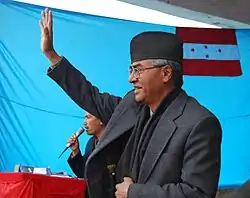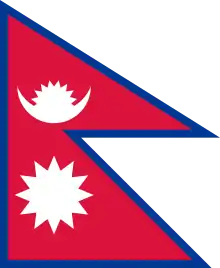Sher Bahadur Deuba
Sher Bahadur Deuba (Nepali: शेर बहादुर देउवा pronounced ![]() Listen ; born 12 September 1946) is a Nepalese politician who served as Prime Minister from 1995 to 1997, from 2001 to 2002, and from 2004 to 2005, and from 2017 to 2018.[1] He is also the President of Nepali Congress, elected with more than 60% of the votes at the party's 13th Convention in 2016. He has twice been elected as the leader of parliamentary party of the Nepali Congress, thus enabling him to be elected twice as the Prime Minister of Nepal.
Listen ; born 12 September 1946) is a Nepalese politician who served as Prime Minister from 1995 to 1997, from 2001 to 2002, and from 2004 to 2005, and from 2017 to 2018.[1] He is also the President of Nepali Congress, elected with more than 60% of the votes at the party's 13th Convention in 2016. He has twice been elected as the leader of parliamentary party of the Nepali Congress, thus enabling him to be elected twice as the Prime Minister of Nepal.
Sher Bahadur Deuba | |
|---|---|
शेरबहादुर देउवा | |
 | |
| 32nd Prime Minister of Nepal | |
| In office 7 June 2017 – 15 February 2018 | |
| President | Bidhya Devi Bhandari |
| Preceded by | Pushpa Kamal Dahal |
| Succeeded by | Khadga Prasad Oli |
| In office 3 September 2004 – 1 February 2005 | |
| Monarch | King Gyanendra |
| Preceded by | Surya Bahadur Thapa |
| Succeeded by | Girija Prasad Koirala |
| In office 26 July 2001 – 4 October 2002 | |
| Monarch | King Gyanendra |
| Preceded by | Girija Prasad Koirala |
| Succeeded by | Lokendra Bahadur Chand |
| In office 12 September 1995 – 12 March 1997 | |
| Monarch | King Birendra |
| Preceded by | Man Mohan Adhikari |
| Succeeded by | Lokendra Bahadur Chand |
| President of the Nepali Congress | |
| Assumed office 7 March 2016 | |
| Preceded by | Sushil Koirala |
| Member of Parliament for Dadeldhura 1 | |
| Assumed office May 1991 | |
| Preceded by | Constituency established |
| Personal details | |
| Born | 12 September 1946 Ashigram, Kingdom of Nepal |
| Political party | Nepali Congress (Before 2002; 2007–present) |
| Other political affiliations | Nepali Congress-Democratic (2002–2007) |
| Spouse(s) | Arzu Rana Deuba |
| Education | Tribhuvan University |
| Signature | |
He was elected Prime Minister for the second time when he succeeded Girija Prasad Koirala who resigned in July 2001. Deuba dissolved the House of Representatives in May 2002 in order to hold new elections, but was unable to do so due to the ongoing civil war. This also led to a split in Nepali Congress with Deuba spearheading the Nepali Congress (Democratic) party. King Gyanendra then removed Deuba in October 2002 terming him incompetent[2][3] for not holding parliamentary elections. After two other governments, Gyanendra restored Deuba to the position of Prime Minister in 2004. He was again removed from office on February 1, 2005 by King Gyanendra, who dissolved the government for three years and seized direct power.
Deuba was sentenced to two years in prison in July 2005 under corruption charges but was subsequently released on 13 February 2006 after the anti-corruption body that sentenced him was outlawed. An official from Deuba's Nepali Congress (Democratic) party, Dip Kumar Upadhaya, told the Associated Press that Deuba's release was "a victory for democracy and a humiliating defeat for the royal regime".[4]
Political career

Sher Bahadur Deuba has been elected as a Member of Parliament six times in Dadeldhura 1. Following street protests against the UML government of Man Mohan Adhikari, he was declared the Parliamentary Leader of Nepali Congress in 1994.
In the election held to select the Parliamentary Leader for Nepali Congress following the resignation of G. P. Koirala, in 2001, he defeated Sushil Koirala by a huge margin. This victory established him as a powerful leader, especially because his rival was supported by G. P. Koirala, the president of Nepali Congress.
However, in 2009, he lost the election for the position of the Leader of the Parliamentary Party of the Nepali Congress to Ram Chandra Paudel. His loss was attributed to his support for party leader G. P. Koirala, who wanted his daughter, Sujata Koirala, to lead the party.
Nepali Congress (Democratic)
After dispute between Girija Prasad Koirala, President of Nepali Congress and Sher Bahadur Deuba, the Prime Minister, over continuation of Emergency Situation in Nepal, Nepali Congress underwent vertical split into Nepali Congress led by Koirala and Nepali Congress (Democratic) led by Deuba. Both parties ultimately merged in 2007 with the name of unified party to remain as Nepali Congress.

2008 Constituent Assembly election
In the Constituent Assembly election held on 10 April 2008, the Nepali Congress nominated Deuba as its candidate for Dadeldhura and Kanchanpur-4 constituencies under the first-past-the-post (FPTP) system.[5] He won from both the constituencies.
In the subsequent vote for Prime Minister, held in the Constituent Assembly on 15 August 2008, Deuba was nominated by the Nepali Congress, but was defeated by Prachanda of the Communist Party of Nepal (Maoist). Deuba received 113 votes, while Prachanda received 464.[6]
2017 - present
He was sworn in as Prime Minister of Nepal on 7 June 2017.[7][8] Deuba was in charge of the government that successfully conduct the elections of all three levels (Parliamentary, Provincial and Local) in different phases in 2017. After a successful tenure, he resigned on 15 February 2018, paving way for KP Oli to take upon the premiership. Nepali Congress emerged as the largest political party securing 35.75% of votes, compared to 30.68% votes secured by CPN (UML) and 15% votes secured by CPN (Maoists), however KP Oli became the Prime Minister due to combined votes of two communist parties in the 2017 Nepalese legislative election.[9] Sher Bahadur Deuba was credited for successfully holding the Legislature-Parilament Elections which paved way for the new Constitution of Nepal to be implemented by successfully conducting elections in a turbulent time when several Nepali Congress candidates were personally attacked and injured.[10]
Personal life
Deuba comes from Ganyapdhura Gaupalika Ward No. 01 previously known as (Asigram - 3), Dadeldhura, one of the most remote district in the Far West Region of Nepal.[11] He has six brothers, including Sher Bahadur, who is the eldest.
He is married to Dr. Arzu Rana Deuba.[12]
In November 2016, Deuba was conferred an honorary doctorate degree by Jawaharlal Nehru University.[13]
Deuba has a Master's Degree in Political Science and he holds a Bachelor's Degree in Arts and Law.
Socialist International
Deuba was elected as the Vice President of Socialist International during its Congress held in Athens, Greece from 30 June 2008 to 2 July 2008.[14]
References
- "Sher Bahadur Deuba elected 40th PM of Nepal". Retrieved 6 June 2017.
- Bogue, Janet. "DEUBA DUBBED PRIME MINISTER; CONGRESS' KOIRALA OUT IN THE COLD". Wikileaks. Wikileaks. Retrieved 6 December 2018.
- Bhattarai, Kamal Dev. "Can Nepal's New Prime Minister Avert a Crisis?". The Diplomat. Retrieved 16 September 2017.
- "Former Nepal PM freed from jail". 14 February 2006. Retrieved 8 September 2018 – via news.bbc.co.uk.
- NC names FPTP candidates Archived 26 July 2007 at Archive.today
- "Ex-rebels' chief chosen as Nepal's new PM", Associated Press (International Herald Tribune), 15 August 2008.
- "Sher Bahadur Deuba sworn in as Prime Minister of Nepal". 7 June 2017.
- "Sher Bahadur Deuba resigns, KP Oli to take over as Nepal PM". 15 February 2018. Retrieved 8 September 2018.
- https://en.wikipedia.org/wiki/2017_Nepalese_legislative_election. Retrieved 1 October 2020. Missing or empty
|title=(help). - https://en.wikipedia.org/wiki/2017_Nepalese_legislative_election. Retrieved 1 October 2020. Missing or empty
|title=(help). - "PM Deuba casts his vote in Dadeldhura". kathmandupost.com. Retrieved 26 September 2019.
- "Deuba elected as 40th Prime Minister of Nepal". My Republica. 6 June 2017. Retrieved 10 December 2017.
- "Deuba conferred JNU's honorary doctorate degree". The Kathmandu Post. 7 November 2016. Retrieved 7 November 2016.
- "PM-elect Deuba's Profile". kathmandupost.com. Retrieved 26 September 2019.
External links
| Political offices | ||
|---|---|---|
| Preceded by Man Mohan Adhikari |
Prime Minister of Nepal 1995–1997 |
Succeeded by Lokendra Bahadur Chand |
| Preceded by Girija Prasad Koirala |
Prime Minister of Nepal 2001–2002 |
Succeeded by Lokendra Bahadur Chand |
| Preceded by Surya Bahadur Thapa |
Prime Minister of Nepal 2004–2005 |
Succeeded by Girija Prasad Koirala |
| Preceded by Pushpa Kamal Dahal |
Prime Minister of Nepal 2017–2018 |
Succeeded by KP Sharma Oli |
| Diplomatic posts | ||
| Preceded by Chandrika Kumaratunga |
Chair of the South Asian Association for Regional Cooperation 2002 |
Succeeded by Zafarullah Khan Jamali |
